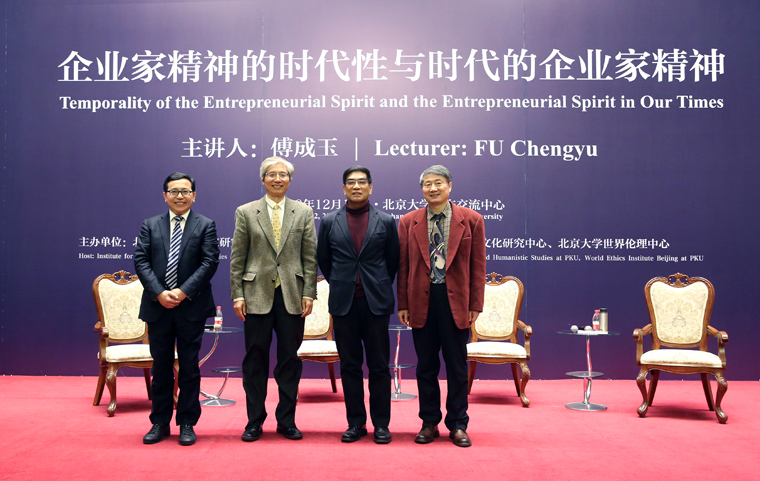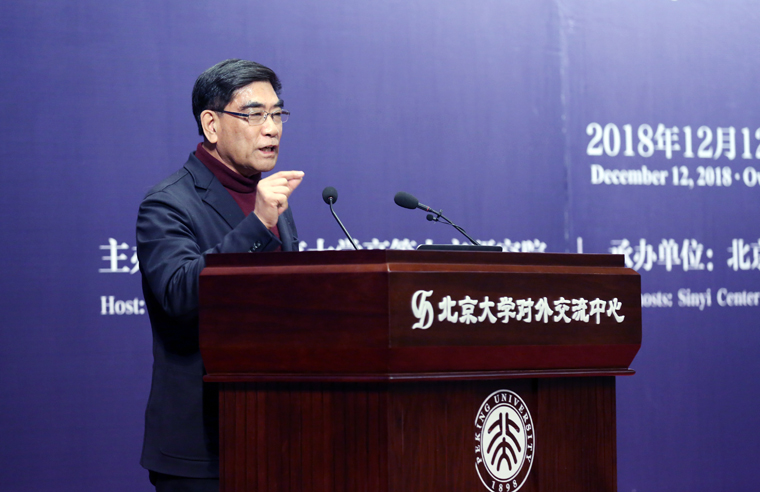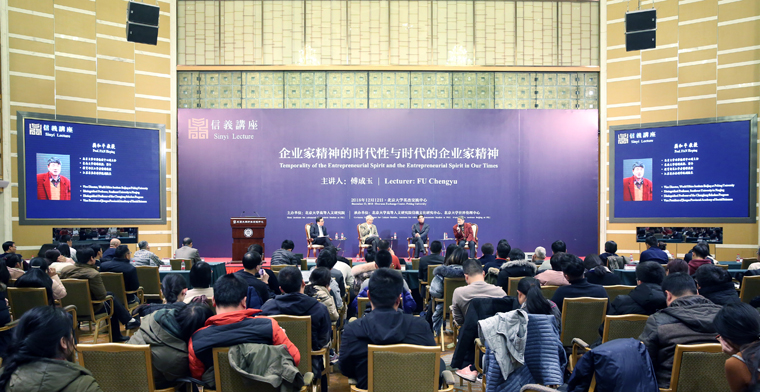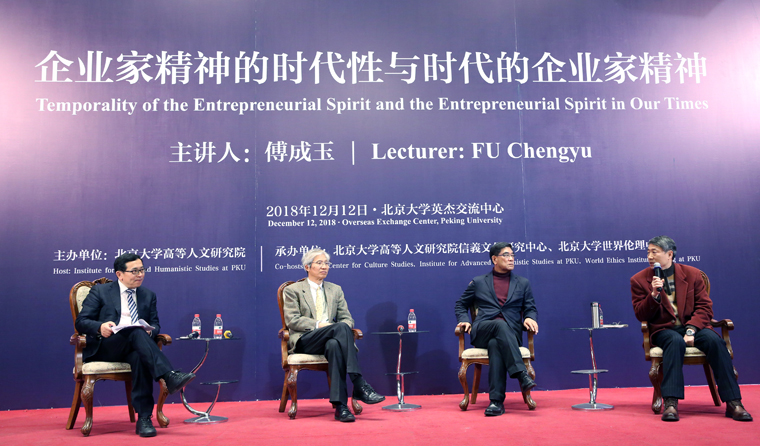
 photo of Sinyi Lecture 2018
photo of Sinyi Lecture 2018 from the left: Dr. Wang Jianbao, Prof. Yao Xinzhong, Mr. Fu Chengyu, Prof. Fan Heping
from the left: Dr. Wang Jianbao, Prof. Yao Xinzhong, Mr. Fu Chengyu, Prof. Fan Heping
On December 12, 2018, at 7:00 p.m., the third Sinyi Lecture was held at the Sunshine Hall of Overseas Exchange Center of Peking University. The lecture is organized by the Sinyi Center of the Institute of Advanced Humanities Studies of Peking University and the World Ethics Center of Peking University. It is a large-scale lecture aimed at providing a high-level dialogue platform. Around the theme of the modern destiny, mission and transformation of Confucianism tradition in the context of commercial society, well-known scholars and elites of the industry are invited to discuss the relevant issues in business practice, so as to cross the boundary of disciplines, merge the division of theory and practice, explore, enrich and apply the spiritual, moral, ethical and institutional resources of Confucian tradition, highlight and expand the value of "humanity", and promote the exploration and construction of new business ethics in the perspective of spiritual humanism.
Over the past three years, the academic theme of Sinyi Lecture has been consistently focused on the "Modern Transformation of Confucian tradition" and the elaboration of "spiritual humanism" in the global horizon. Scholars who attended the lectures discussed and speculated together to pursue the facts and truth. On December 8, 2016, the well-known economist Professor Sun Zhen, used to be president of Taiwan University, was invited to give the first lecture on the topic "Modern Economic Mission of Confucian Ethics". He also had a dialogue with Prof. Tu Weiming and Mr. Zhou Junji, Chairman of Taiwan Sinyi Enterprise Group. On November 22, 2017, the second Sinyi Lecture invited the famous managerialist and educator in Taiwan, Professor Xu Shijun. He is the founder and first dean of the School of Management of Taiwan University. The topic of the lecture is "the ethical basis of cybereconomy". He also had a dialogue with Professor Tu about "Confucian Tradition and the Entrepreneurship". The third Sinyi Lecture on December 12, 2018 continued the theme of "Confucian Tradition and the Entrepreneurship". Mr. Fu Chengyu, former chairman of Sinopec and standing member of the 12th CPPCC National Committee, was invited to give a lecture on " Epochality of the Enterpreneurial Spirit and the Enterpreneurial Sipirit in Our Times ". He thoroughly explained the epreneurship of the times, the connotation of contemporary entrepreneurs and the intrinsic connection between Confucian tradition and entrepreneurs.
 Mr. Fu Chengyu
Mr. Fu Chengyu
The first part of this lecture is Mr. Fu Chengyu's keynote speech - " Epochality of the Enterpreneurial Spirit and the Enterpreneurial Sipirit in Our Times ". The speech began with the warm applause of the audience, and was presided by Dr. Wang Jianbao, director of the Center for Humanities and Business Ethics Research of CKGSB and associate researcher of the Institute of Advanced Humanities Studies of Peking University. Mr. Fu Chengyu thanked Mr. Tu Weiming for his sincere invitation, and introduced the original intention of the topic of this speech. He said that to discuss on the theme of "entrepreneurship" is to combine his long-standing practice of enterprise management with the current social hot spots. He wishes to think deeply about the characteristics of Chinese culture and the entrepreneurship in the new era, as well as the "spiritual humanism" foundation behind the entrepreneurship.
Mr.Fu Chengyu's speech mainly consists two aspects: the foundation of entrepreneurship and the entrepreneurship in contemporary time. When explaining the foundation of entrepreneurship, Mr. Fu pointed out that entrepreneur and entrepreneurship have three main characteristics: temporariality, people-oriented and practical. The entrepreneurship means to seek for the development of human beings through the form and content of the times. Therefore, the entrepreneurship has the absoluteness of the times and the relativity of history. Its epochality is mainly embodied in two aspects: first, entrepreneurship is often directed at a given market or a given society. The requirements for entrepreneurs at different stages of development are different. Second, entrepreneurs should comply with the needs of the times to find and solve urgent problems of the times, especially the survival crisis, moral crisis and development crisis facing the present era. The nature of eople-oriented of entrepreneurship means that entrepreneurs should firmly establish the faith that people are the main driving force of historical development. At the same time, the most fundamental purpose of the exertion of entrepreneurship is to promote the development of people themselves. The entrepreneur is a special figure, but not a special person. The end of the entrepreneur is not for himself and the enterprise itself, but for the whole society and the public. The practicality of entrepreneurship, as advocated by the Marxist theory of practice, should be consistent with the practice of the general public. To change the world is always the purpose and fruit of practice.
When talking about "what kind of entrepreneurship is needed in this era", Mr. Fu Chengyu said that the core of entrepreneurship and also the most important leadership of entrepreneurs is "the power of thinking". In the new era, the core competitiveness of excellent entrepreneurs is innovation. In a word, the excellent entrepreneurs in the new era must feature the characteristics of "big vision, big sentiment, big pattern and big responsibility". "Big vision" is to have a global vision and a strong "perception", which enables one to predict the future international and domestic political and economic trends, technological and industrial development directions, and provide the intuitive and perceptual knowledge for technological innovation of enterprises;
"Big sentiment" is embodied in taking the country, society and the whole public as the community of interests and service objects.. It requires to coordinate enterprises'own interests with the interests of the state, the society and the general public. The "big pattern" means that entrepreneurs should take the example of the ancient great figures who believed in "the world belonged to the public" and actively respond to the call of "one belt and one road" and "building the community of human destiny" advocated by general secretary Xi Jinping's. They should participate in the international chorus in the tide of global economic integration and become the practitioner and promoter of the construction of the community of human destiny.
"Big responsibility" means that entrepreneurs should bravely undertake various missions, including social responsibility. Mr. Fu pointed out here that not only state-owned enterprises, but also private enterprises should take all of economic, social and political responsibilities. Among them, "political responsibility", especially the greatest political - people's livelihood, is an inescapable important role for contemporary Chinese entrepreneurs.
 the session of thematic dialogue (from the left: Dr Wang Jianbao, Prof. Yao Xinzhong, Mr. Fu Chengyu, Prof. Fan Heping)
the session of thematic dialogue (from the left: Dr Wang Jianbao, Prof. Yao Xinzhong, Mr. Fu Chengyu, Prof. Fan Heping)
The second part of this lecture is a dialogue on the theme of "Confucian tradition and entrepreneurship". Professor Fan Ping, Professor Yao Xinzhong and Mr. Fu Chengyu discussed this topic successively. Professor Fan Ping first responded to the theme discussed in Mr. Fu Chengyu's speech. He pointed out that China now needs entrepreneur, and entrepreneurship particularly. On the one hand, entrepreneurship is a necessary qualification for entrepreneurs. At the same time, it is also a qualification for entrepreneurs to transcend themselves. It is the intrinsic life motivation to be and transcend oneself.
Professor Fan claimed based on his academic achievements in empirical research on ethics that entrepreneurs face many tensions and difficulties in the series of career chains such as "winning the market, wealth, society, ethics, culture and life". He analyzed the relationship between ethics and economy from various perspectives, including Confucius and Mencius' “differentiation of justice and profits”, Dong Zhongshu, Zhuxi, “relationship between morality and enterprise” of Confucianism in the Qing Dynasty, and Adam Smith's "moral sentiment" and "national wealth". Finally, it comes to the conclusion that "the real construction, development and flourishing of entrepreneurship and Chinese entrepreneurship needs a thorough ethical awareness and cultural consciousness."
 the session of thematic dialogue (from the left: Dr Wang Jianbao, Prof. Yao Xinzhong, Mr. Fu Chengyu, Prof. Fan Heping)
the session of thematic dialogue (from the left: Dr Wang Jianbao, Prof. Yao Xinzhong, Mr. Fu Chengyu, Prof. Fan Heping)
Professor Yao Xinzhong started with the original French meaning of the word "entrepreneur". He cited from the Confucian classics Mencius as a reference to interpret entrepreneurship:“A gentleman lays the foundation of the inheritance, and hands down the beginning which he has made, doing what may be continued by his successors. As to the accomplishment of the great result, that is with Heaven. What is that Qi to you? Be strong to do good. That is all your business.". Professor Yao pointed out that, first of all, we should make a clear distinction between businessmen and entrepreneurs. We often see all kinds of bosses, chairmen and CEOs around us. All these businessmen can not be called entrepreneurs, for that entrepreneurs want to innovate and do something different, rather than duplicate the work of others. First, entrepreneurs should meet the requirements of the times and contribute to the theme of peace and development.
Secondly, entrepreneurs are adventurers. An important characteristic of entrepreneurs is not only to start a business, but also to take risks. Therefore, not all entrepreneurs can succeed. Third, not all successful entrepreneurs feature the spirit of entrepreneurship. Many successful entrepreneurs do not necessarily have entrepreneurship. Then, Professor Yao further interpreted the Confucian tradition of " A gentleman lays the foundation of the inheritance, and hands down the beginning which he has made": entrepreneurs and entrepreneurship mean to be a gentleman.Only gentleman can lay the foundation of the inheritance be vertical, can hand down the beginning which he has made, and thus,can create a large-scale enterprise. " A gentleman lays the foundation of the inheritance, and hands down the beginning which he has made, doing what may be continued by his successors.", that is, to inherit and continue developing, which requires responsibility for both enterprise and society. Entrepreneurs undoubtedly aim at creating wealth. Otherwise, they can't be "do good" as Mencius said. He responded the entrepreneur ethics dilemma Professor Fan mentioned before, and agreed with Mr. Fu Chengyu's insights of “big vision, big sentiment and big responsibility”. Finally, he proposed that the spirit of the times and entrepreneurship should be organically combined.
Mr. Fu Chengyu also responded to the main points of the two professors in the thematic dialogue. In particular, he emphasized that entrepreneurship requires "self-cultivation and morality" advocated by Confucian tradition, which is more important than doing bigger business. Dr. Wang Jianbao summarized the thematic dialogue between Professor Fan Ping, Professor Yao Xinzhong and Mr. Fu Chengyu. In the Q&A session, the three guests and presenters respectively answered the questions raised by the audience, such as the transcendence of "heaven, earth, society and oneself" of spiritual humanism and the relationship between the "heaven" and entrepreneurship, the education of entrepreneurship, the dilemma of the development of small and micro enterprises, the hot issues of local private economy, and the collection and publication of the productions of Sinyi Lecture. Around 9:30, the lecture ended with warm applause from more than 200 listeners.
Liu Gaosheng (post-doc from IAHS)

Copyright@2014Institute for Advanced Humanistic Studies,PKU 京ICP备案1253235 Address: 4 Bldg,Lee Shau-kee Humanities,PKU,5 Yiheyuan Rd.,Haidian District,Beijing.